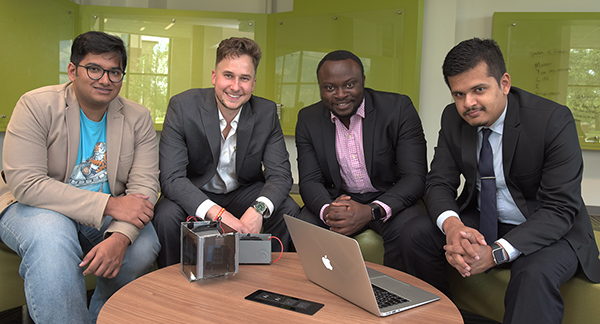AtmoSpark team nets NSF Innovation Corps grant
 AtmoSpark Water Generation, developed by Tejus Mane, a master’s student in chemical engineering at Lamar University, has received a National Science Foundation Innovation Corps grant for $50,000 to facilitate a 7-week customer discovery tour.
AtmoSpark Water Generation, developed by Tejus Mane, a master’s student in chemical engineering at Lamar University, has received a National Science Foundation Innovation Corps grant for $50,000 to facilitate a 7-week customer discovery tour.
Originally envisioned as a solution to water shortages in developing countries, the technology holds promise as one means of addressing potable water needs in rural areas and mobile recreation activities, Mane said.
“We are an atmospheric water generation company developing technology to bring fresh water to rural and urban communities and hard to reach areas such as offshore platforms, for disaster relief and in maritime,” Mane said.
The NSF I-Corps program prepares scientists and engineers to extend their focus beyond the university laboratory, and accelerates the economic and societal benefits of NSF-funded, basic-research projects that are ready to move toward commercialization.
Through I-Corps, NSF grantees like AtmoSpark learn to identify valuable product opportunities that can emerge from academic research, and gain skills in entrepreneurship through training in customer discovery and guidance from established entrepreneurs.
The grant will allow team members to travel around the country, interviewing potential customers to analyze market segments. The grant also includes a workshop that begins January 16 in Seattle.
Mane, CEO of AtmoSpark, and co-founder Aniket Khade, a Ph.D. student in chemical engineering at LU, submitted the grant proposal with the help of LU’s Center for Innovation, Commercialization and Entrepreneurship (CICE), the Office of Sponsored Research, and Jerry Lin, senior director of graduate programs, University Professor and Ann Die-Hasselmo Faculty Scholar at LU.
Damilola Runsewe, a master’s student in chemical engineering, and Matthew Bukovicky, an M.B.A. student in leadership, join Mane and Khade on the team.
The NSF grant is not the first support the team has received. They came away with the top prize in three recent competitions: the 2017 Texas Rural Challenge, the Big Idea Challenge at LU, and the Texas State University Business Plan competition.
The AtmoSpark project gained additional traction this summer by participating in OwlSpark, Rice University’s three-month entrepreneurship accelerator program, where they developed a mock-up prototype of the device. While there, Joey Lou, a mechanical engineering major at Rice University, and Kaarthika Thakker, a computer science and entrepreneurship major at Rice University, joined with the AtmoSpark team for the duration of OwlSpark. The combined team had opportunity to pitch their ideas to Houston entrepreneurs during a demo day in August.
The team is refining the product at LU’s Center for Innovation, Commercialization and Entrepreneurship (CICE).
Mane first had the idea while attending the Technology Innovation and Entrepreneurship graduate class taught by David Cocke, the Jack M. Gill Endowed Chair of Chemical Engineering and associate director of the CICE. The class changed his professional trajectory, Mane said, to a future in entrepreneurship.
“Dr. David Cocke’s class at the CICE was the major reason we were able to start this project, and are now able to bring it to a state that we are able to get NSF funding for customer discovery and other outside funding as well,” Mane said. “The CICE has been a huge support for us, and we are excited to also engage with NSF and LU engineering during this phase.”


